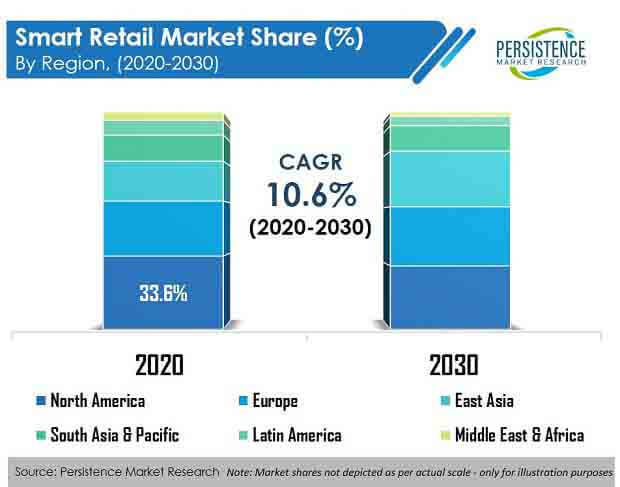Smart Retail Market is Segmented by components such as Hardware includes RFID Tags and Labels, Scanner, Readers, Mobile Computers, POS Terminals having Smart Retail Software includes Retail Management Software, POS Software, Inventory Management with services such as Integration and Deployment, Retail Consulting, Support and Maintenance
Industry: IT and Telecommunication
Published Date: May-2020
Format: PPT*, PDF, EXCEL
Delivery Timelines: Contact Sales
Number of Pages: 380
Report ID: PMRREP31496
Advancements in smart retail solutions including different features such as sales reporting, sales analytics, and inventory management; POS including wireless mobile devices; and cloud computing enabling better customer interaction, are expected to drive the growth of the smart retail market during the forecast period.
This helps retailers to sell their wares at the right price, the right time to the customer almost every single time, and gain a competitive advantage in the market.
Lack of compliance on the part of IoT solution providers and integrators, and lack of user knowledge and awareness for smart retail, are the primary factors that would challenge the adoption of smart retail in the global market during the forecast period (2020 to 2030).
Handheld RFID inventory management platforms will help improve customer experience, allow for quick and efficient restocking of merchandise, and increase sales. The implementation of RFID technology in retail markets to support the Omnichannel strategy caters to the changing shopping habits of customers.
RFID technology allows tracking missing products from the sales platform. An RFID inventory system increases inventory management efficiencies and provides deeper merchandise visibility.
RFID technology is also used for reducing costs and maintaining efficiencies at the right time when retailers are battling fiercely. By reducing out-of-stock and overstock scenarios, retailers can maximize product availability to help convert sales.
Continuously evolving new technologies such as smart communication technology, smart store technology, and AI facial recognition technology, in the retail industry, are driving the smart retail market.
Digital and online technologies are creating potential growth opportunities for smart retail, as these technologies improve communication between retailers and customers, as well as help retailers position their products and organize their processes and value chain.
For instance, in September 2019, the Ingenico Group announced a partnership with M&S, a major British multinational retailer company. Both companies work together to launch a new payment services that involve all M&S customer digital channels and touchpoints, which is critical to maintaining customer experience and sales goals.
Increasing adoption of Internet of Things (IoT) technology for various applications, such as workforce skill alteration, smart retail automation, and connected retail services, is rapidly fueling the growth of the global smart retail market.
Internet of Things (IoT)-based smart retail products such as radio-frequency identification (RFID) tags are used for tracking systems to monitor and detect goods and control of inventory. These IoT-based products are also used for tracking product deliveries.
The adoption of Internet of Things (IoT) in smart retail offers different advantages, such as reduced time and effort, user-friendly, easy access of product information, and cost-efficiency. These factors are anticipated to contribute to the growth of the smart retail market over the coming years.

The smart retail market is witnessing rapid growth in the East Asia & Europe regions, due to increasing adoption of mobile and connected devices. Smart retail market providers strive to expand their operations in Japan, South Korea, Germany, China, the U.K, and Spain, to unlock new growth avenues, attributable to the growing demand for retail in these countries.
Introduction of new products and collaborations & partnerships are key strategies followed by top players in the smart retail market to increase their business revenue. Smart retail product manufacturers and service providers are focusing on innovation in products/services to improve their market positions.
Some of the leading players in the smart retail market are NCR Corporation, Samsung Electronics Co. Ltd., Ingenico Group, Cisco Systems, Inc., and Huawei Technologies Co., Ltd.
Over the past few years, manufacturers and service provider are focused on smart retail IOT solutions for simplifying the process of connecting IoT components with cloud-based services by providing a superior customer experience, which is creating significant growth opportunities for players in the smart retail market.
Among other regions, North America is the most prominent region, and held a market share of 34% in the global smart retail market in 2019. The ongoing Covid-19 pandemic has led to the temporary shutting down of most physical stores across the world. Market growth has been hit, but this will inspire vendors in the smart retail market to innovate in AI through rigorous R&D.
PMR’s report on the global smart retail market offers a detailed market segmentation, wherein, key segments have been discussed in detail. This report by PMR carefully examines the smart retail market at a global as well as regional level, through market segmentation on the basis of multiple parameters such as component, retailer size, end user, and region.
Every segment has been analyzed in detail, and data pertaining to the growth of each segment has been included in the report.
| Attribute | Details |
|---|---|
|
Component |
|
|
Retailer Size |
|
|
End User |
|
|
Region |
|
The smart retail market is estimated to be worth US$ 19 Bn in the year 2021.
The smart retail market is expected to expand threefold between 2021 and 2031.
The smart retail market witnessed a CAGR of 9% between 2015 and 2020.
The latest trend is that of emphasizing on the technologies like mobile, RFID, cloud, beacons, and various others for rendering connected retail services, thereby driving the smart retail market.
Growing integration towards automation and robotics in the retail industry is driving the demand for smart retail services.
The top 5 players, namely IBM, Cisco, Microsoft, NXP Semiconductors, and Samsung Electronics hold more than 30% of the market share.
The top 5 countries driving demand include the US, UK, South Korea, Japan, and China.
North America holds more than 35% of the market share with the US driving growth.
Europe is expected to register growth at the rate of 8.5% in the smart retail market between 2021 and 2031.
The US and South Korea are the key providers of smart retail services.
To know more about delivery timeline for this report Contact Sales
